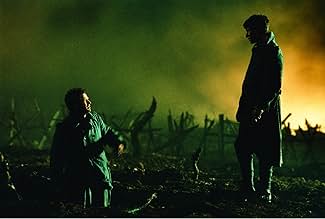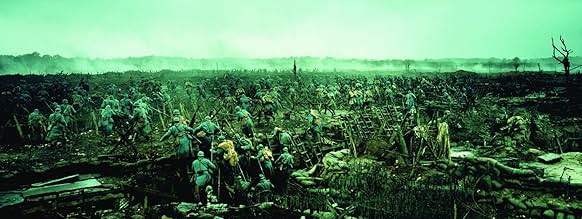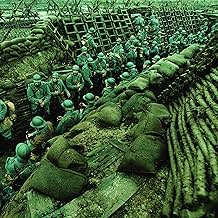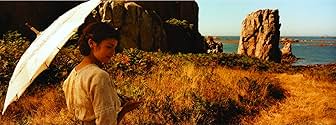IMDb-BEWERTUNG
7,6/10
77.131
IHRE BEWERTUNG
Erzählt die Geschichte der unerbittlichen Suche einer jungen Frau nach ihrem Verlobten, der während des Ersten Weltkriegs spurlos aus den Schützengräben an der Somme verschwunden ist.Erzählt die Geschichte der unerbittlichen Suche einer jungen Frau nach ihrem Verlobten, der während des Ersten Weltkriegs spurlos aus den Schützengräben an der Somme verschwunden ist.Erzählt die Geschichte der unerbittlichen Suche einer jungen Frau nach ihrem Verlobten, der während des Ersten Weltkriegs spurlos aus den Schützengräben an der Somme verschwunden ist.
- Für 2 Oscars nominiert
- 17 Gewinne & 35 Nominierungen insgesamt
Jean-Pierre Darroussin
- Benjamin Gordes
- (as Jean Pierre Darroussin)
Jean-Pierre Becker
- Esperanza
- (as Jean Pierre Becker)
Jean-Paul Rouve
- Le facteur
- (as Jean Paul Rouve)
Elina Löwensohn
- La femme allemande
- (as Elina Lowensohn)
Empfohlene Bewertungen
A powerful and emotional war drama from French auteur Jean-Pierre Jeunet. Audrey Tautou leads us through an engaging and well-crafted story which sweeps us into the world of its characters, whom are established and well developed as the story progresses. The film itself is visually arresting with stunning cinematography. It was actually Bruno Delbonnel's visuals that acted as one of the man aspects that allured my interest in the film, it's a visual powerhouse blending the gritty conventions of war with scenes of a more romantic and dramatic style. A harrowing and emotional account of World War I from the perspective of French soldiers and civilians.
10boboloco
This movie is better than "Amelie" (which I loved). The story is intricately plotted so people with a "Seed of Chucky" attention span will be overwhelmed. It must be the only movie to combine amazing combat scenes with romance, comedy and a complex mystery puzzle. Audrey Tatou is a goddess. Jeunet (the director) is like a combination of Chaplin (the romance and comedy); Hitchcock (the incredible camera work and storytelling); and Spielberg (the battle scenes and emotion).
As to some of the comments I have seen on this site:
There were French people complaining that people were speaking too fast. Gee, I don't speak French, but I can read subtitles just fine, so it was not a problem.
Some people complained that it was too long. Then there were people that complained it was too short. Like Goldilocks, I thought it was just right.
There were those that said that Tatou can't act. Audrey's performance was nuanced people, she's no Jim Carrey. Some said she was just playing Amelie again. Wrong. Amelie was a good-hearted but wishy-washy spirit who was afraid to take any action in her own life. Mathilde is just the opposite, somebody who believes so strongly in her convictions that she is able to follow what her heart tells her in spite of all available evidence and every single person she meets. In fact, every actor, no matter how small the role, turns in a great performance (I'm especially partial to the great Dominique Pinon, who plays Audrey's uncle).
There were complaints about the sex. There are a couple of brief shots of people having sex in the introduction, very similar to Amelie. Plus you get to see Jodie Foster doing the nasty from several directions. If that bothers you, go see Polar Express instead. Personally (especially in light of the rumors of Jodie being a lesbian) I am in favor of the sex scenes. There is also a shot of Audrey's fabulous naked booty, which justifies the price of admission all by itself.
Someone else complained that it was too jarring switching between the horrific WWI trench warfare scenes and the idyllic 1920s Paris. Argghhhh, that's the point!
Then there was the complaint about seeing a scene or shot from a different perspective later in the movie. Have you heard of a story called "Rashomon"? The idea is that you are experiencing the events from the viewpoint of different characters. This is cleverly done and never superfluous. At least one time you are quite startled by new information revealed by that shift in perspective.
All in all, this is a movie that really does have everything. If it were an American movie it would win best picture, best actress, best supporting actress (Jodie still might get nominated), best cinematography, best script from a novel, and best director. As it is scheduled for a Christmas national release, hopefully a lot of people will see it.
As to some of the comments I have seen on this site:
There were French people complaining that people were speaking too fast. Gee, I don't speak French, but I can read subtitles just fine, so it was not a problem.
Some people complained that it was too long. Then there were people that complained it was too short. Like Goldilocks, I thought it was just right.
There were those that said that Tatou can't act. Audrey's performance was nuanced people, she's no Jim Carrey. Some said she was just playing Amelie again. Wrong. Amelie was a good-hearted but wishy-washy spirit who was afraid to take any action in her own life. Mathilde is just the opposite, somebody who believes so strongly in her convictions that she is able to follow what her heart tells her in spite of all available evidence and every single person she meets. In fact, every actor, no matter how small the role, turns in a great performance (I'm especially partial to the great Dominique Pinon, who plays Audrey's uncle).
There were complaints about the sex. There are a couple of brief shots of people having sex in the introduction, very similar to Amelie. Plus you get to see Jodie Foster doing the nasty from several directions. If that bothers you, go see Polar Express instead. Personally (especially in light of the rumors of Jodie being a lesbian) I am in favor of the sex scenes. There is also a shot of Audrey's fabulous naked booty, which justifies the price of admission all by itself.
Someone else complained that it was too jarring switching between the horrific WWI trench warfare scenes and the idyllic 1920s Paris. Argghhhh, that's the point!
Then there was the complaint about seeing a scene or shot from a different perspective later in the movie. Have you heard of a story called "Rashomon"? The idea is that you are experiencing the events from the viewpoint of different characters. This is cleverly done and never superfluous. At least one time you are quite startled by new information revealed by that shift in perspective.
All in all, this is a movie that really does have everything. If it were an American movie it would win best picture, best actress, best supporting actress (Jodie still might get nominated), best cinematography, best script from a novel, and best director. As it is scheduled for a Christmas national release, hopefully a lot of people will see it.
An epic love story on a World War I background. Far from Amelie, the team Jeunet/Tautou demonstrates his talent, showing with poetry love and war, beauty and horror, sweetness and violence. Mathilde and Manech, played by the stunning Audrey Tautou and the new French heart-throb Gaspard Ulliel, are the ideal lovers, determinate, passionate, separated by destiny, hoping...because hope is the message, the only one of a film where love is giving and giving again. If you loved Cold Mountain you will adore "A very long engagement". If don't know yet what it is to hold someone's heart in your hand, to feel the beatings of somebody's heart like the Morse alphabet, this movie will explain it to you, and you never will be the same anymore.
10lawprof
Director Jean-Pierre Jeunet in the hit, "Amelie," employed scintillating Audrey Tatou, the most expressive young French actress in film today, to portray a whimsical and charming girl-woman in search of love. With her now as a young French rural ingénue searching for years after The Great War (aka World War I or, even better, The War to End All Wars) for a probably killed fiancé, Jeunet crafted a moving, often penetrating story centering on the charnel carnage of trench warfare.
Lame as a single-digit-age child because of polio and living with relatives who took over after her parents were killed in an accident, Mathilde is befriended by Manech (Gasparad Ulliel). Mathilde, a loner separated from her peers by her disability, and Manech become closest friends. Late adolescence brings love and lust, commitment and an engagement.
But in 1917 the French Army needed fresh meat for the bloody maw that was warfare on the almost terminally static Western Front. And off went Manech along with many others who never returned.
Employing the harshest discipline of any Western army in modern history, the French Army (which gave the world the Dreyfus trial and in World War I actually used decimation to punish mutinous regiments and divisions) sentences Manech and four others to be cast into No Man's Land without weapons, without any possibility of being allowed to return but with the macabre requirement that they respond to morning roll call if alive (not a good bet). Their alleged crime was self-mutilation to get out of combat (what we call in the American military, "SIW," Self-Inflicted Wounds).
Mathilde in 1920, steely faithful in a moving and believable way, searches fervently for her fiancé whom she believes "must" be alive somewhere, somehow. Employing artful stratagems and enlisting the willing, the paid and the dragooned, her search takes her to cities and battlefields. With resort to a child's employment of magical thinking she frequently whispers tests about what will happen in immediate, ordinary circumstances with one result "proving" for her that Manech is still alive. Tatou makes this self-deception appealing and infinitely sad.
As Spielberg did in "Saving Private Ryan," Jeunet brings the immediacy of the meat-grinding battlefield to the viewer over and over again through superb if sometimes difficult to watch cinematography. Of course no film truly captures the desperation, the epidemic fatality that gripped and demoralized the French Army after years of immobile, set-piece fighting. One needs to read Robert Graves or Siegfried Sassoon for that. But Jeunet has brought to the screen the most realistic World War I trench scenes since "All Quiet on the Western Front" (the 1930 original, of course).
Tatou is an acting tsunami here, alternately beguiling and tense and always hopeful while fighting despair. Expect to see her in many fine roles in the future. She's marvelous.
The entire cast is excellent-few are known in the U.S.
A remarkable movie with an ending that will satisfy and disturb at the same time.
Tatou and Jeunet deserve Oscar nominations.
10/10
Lame as a single-digit-age child because of polio and living with relatives who took over after her parents were killed in an accident, Mathilde is befriended by Manech (Gasparad Ulliel). Mathilde, a loner separated from her peers by her disability, and Manech become closest friends. Late adolescence brings love and lust, commitment and an engagement.
But in 1917 the French Army needed fresh meat for the bloody maw that was warfare on the almost terminally static Western Front. And off went Manech along with many others who never returned.
Employing the harshest discipline of any Western army in modern history, the French Army (which gave the world the Dreyfus trial and in World War I actually used decimation to punish mutinous regiments and divisions) sentences Manech and four others to be cast into No Man's Land without weapons, without any possibility of being allowed to return but with the macabre requirement that they respond to morning roll call if alive (not a good bet). Their alleged crime was self-mutilation to get out of combat (what we call in the American military, "SIW," Self-Inflicted Wounds).
Mathilde in 1920, steely faithful in a moving and believable way, searches fervently for her fiancé whom she believes "must" be alive somewhere, somehow. Employing artful stratagems and enlisting the willing, the paid and the dragooned, her search takes her to cities and battlefields. With resort to a child's employment of magical thinking she frequently whispers tests about what will happen in immediate, ordinary circumstances with one result "proving" for her that Manech is still alive. Tatou makes this self-deception appealing and infinitely sad.
As Spielberg did in "Saving Private Ryan," Jeunet brings the immediacy of the meat-grinding battlefield to the viewer over and over again through superb if sometimes difficult to watch cinematography. Of course no film truly captures the desperation, the epidemic fatality that gripped and demoralized the French Army after years of immobile, set-piece fighting. One needs to read Robert Graves or Siegfried Sassoon for that. But Jeunet has brought to the screen the most realistic World War I trench scenes since "All Quiet on the Western Front" (the 1930 original, of course).
Tatou is an acting tsunami here, alternately beguiling and tense and always hopeful while fighting despair. Expect to see her in many fine roles in the future. She's marvelous.
The entire cast is excellent-few are known in the U.S.
A remarkable movie with an ending that will satisfy and disturb at the same time.
Tatou and Jeunet deserve Oscar nominations.
10/10
10gort-8
This is one of those times that a rating system breaks down. I gave this film a "10" only because there were no "20's" available.
This film, in its own way, seems to be able to fire on those same diverse cylinders that William Shakespeare so often did. It's a light and airy comedy. It's the bitterest of tragedies. It's a beautiful romance. It's an unfolding mystery. At it's heart it is a film of war. War, in all its boiling chaos, touches on all those experiences and more.
When I left the theater I was both elated and depressed. My elation came from having just had such a pure cinematic experience. My depression came from glancing at the marquee and reminding myself that I'll have to survive on the sort of cinema half-life provided by the pablum that normally makes it to the screen. Every now and again it's great to be reminded just how good a movie can be.
This film, in its own way, seems to be able to fire on those same diverse cylinders that William Shakespeare so often did. It's a light and airy comedy. It's the bitterest of tragedies. It's a beautiful romance. It's an unfolding mystery. At it's heart it is a film of war. War, in all its boiling chaos, touches on all those experiences and more.
When I left the theater I was both elated and depressed. My elation came from having just had such a pure cinematic experience. My depression came from glancing at the marquee and reminding myself that I'll have to survive on the sort of cinema half-life provided by the pablum that normally makes it to the screen. Every now and again it's great to be reminded just how good a movie can be.
Wusstest du schon
- WissenswertesWhen casting Jodie Foster, Jean-Pierre Jeunet met her in Paris at the café which was used to shoot the scenes in Die fabelhafte Welt der Amelie (2001) which is near where he lives. Some tourists were at the café, knowing it was featured in the film, asked Jeunet and Foster to move out of the way (not recognizing them) so that they could take a photograph of the café.
- PatzerIn the film there is an important storyline about an albatross. However, throughout the film in all footage depicting the albatross a gannet is shown. Though a gannet is also a large seabird, it looks nothing like an albatross.
- Zitate
Ange Bassignano: [writes] "Revenge is pointless. Try to be happy and don't ruin your life for me."
- VerbindungenEdited from Nomaden der Lüfte - Das Geheimnis der Zugvögel (2001)
- SoundtracksÇa ne Vaut pas l'Amour
Music by François Perpignan
Lyrics by Alexandre Trébitsch
Performed by Esther Lekain
Top-Auswahl
Melde dich zum Bewerten an und greife auf die Watchlist für personalisierte Empfehlungen zu.
- How long is A Very Long Engagement?Powered by Alexa
Details
- Erscheinungsdatum
- Herkunftsländer
- Sprachen
- Auch bekannt als
- A Very Long Engagement
- Drehorte
- Héaux de Bréhat, Côtes-d'Armor, Frankreich(lighthouse exteriors)
- Produktionsfirmen
- Weitere beteiligte Unternehmen bei IMDbPro anzeigen
Box Office
- Budget
- 56.600.000 $ (geschätzt)
- Bruttoertrag in den USA und Kanada
- 6.524.389 $
- Eröffnungswochenende in den USA und in Kanada
- 101.749 $
- 28. Nov. 2004
- Weltweiter Bruttoertrag
- 69.424.389 $
- Laufzeit2 Stunden 13 Minuten
- Farbe
- Sound-Mix
- Seitenverhältnis
- 2.35 : 1
Zu dieser Seite beitragen
Bearbeitung vorschlagen oder fehlenden Inhalt hinzufügen

Oberste Lücke
What is the Japanese language plot outline for Mathilde - Eine große Liebe (2004)?
Antwort




































